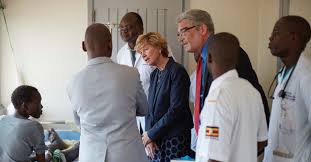Source: fredhutch.org
Long before I became president and director of Seattle’s Fred Hutchinson Cancer Research Center, I learned all-too-well the link between infectious disease and cancer.
As a medical student at the University of California, San Francisco during the 1980s, I witnessed the early days of the AIDS epidemic. Young men with HIV were dying in that city by the thousands of unusual opportunistic infections such as pneumocystis pneumonia and rare cancers such as Kaposi sarcoma.
I worked at San Francisco General Hospital on a medical team with Dr. Sue Desmond-Hellmann, who was also profoundly influenced by the suffering there; she went on to a successful career in oncology and infectious disease. Her star kept rising. At the biotechnology pioneer Genentech, she was responsible for the development of a plethora of novel cancer drugs including monoclonal antibodies such as trastuzumab, or Herceptin, for breast cancer and rituximab for B-cell malignancies. Then she returned to lead UCSF as chancellor, and today she is chief executive officer of our good neighbors in Seattle, the Bill & Melinda Gates Foundation.
While our paths have crossed frequently over the years, it was particularly meaningful recently when we met again — this time in, of all places, Kampala, Uganda.
For two pivotal years beginning in 1989, Sue had lived in that city studying HIV/AIDS and cancer at the Uganda Cancer Institute. Last month, she revisited Kampala, and together we walked through the UCI-Fred Hutch Cancer Centre, which is jointly operated by UCI and Fred Hutch’s Global Oncologyprogram. It is a world-class facility with a wonderful staff; and it is a place where the link between infectious diseases and cancer is witnessed daily.
Both of us found it humbling and inspiring to observe the great work being done by many young researchers working in challenging situations where so many cancer patients are also infected with HIV.
In sub-Saharan Africa, 33% of all cancers are caused by infectious agents; and HIV, which severely impairs a person’s immune system, can make that person even more prone to infection by other viruses that can lead to cancers. For example, about 85% of patients at UCI with Kaposi sarcoma — caused by a herpes virus that existed long before AIDS — are HIV-positive as well.
Kaposi sarcoma often presents as dark or purple lesions on the skin of individuals infected with HIV. Until effective antiviral drugs against HIV were developed, it was literally the face of AIDS in the United States. It still takes a toll in Uganda, despite a laudable program to provide these drugs to people there living with HIV.
While at UCI-Fred Hutch, Sue and I met a young woman, Margaret Sunday, who had arrived there with severe Kaposi sarcoma lesions covering her feet and legs. She had been under care for HIV and had been taking antiviral drugs. Sadly, despite this medical attention, her cancer had not been diagnosed early and had gone untreated.
It was immediately apparent that we are still missing something in the screening and treatment of HIV in sub-Saharan Africa. In the United States, HIV screeners also look for cancers. We look for other viral infections, like human papillomavirus, or HPV, that can lead to cervical cancer, understanding that the risk of cervical cancer in women with HIV — nearly all of whom also have HPV — is increased more than fivefold. For patients in the US with HIV, where treatment is widely available, the leading cause of death is no longer opportunistic infection as it was in the 1980s — rather, it is cancer. If we treat HIV but not the cancer, it is as if we are treating half the patient.
In Uganda, I believe we are making progress. The UCI-Fred Hutch Collaboration expands local capacity in scientific research, training and patient care, serving as a great model for addressing global health challenges.
Because of the challenges we face in treating cancer with chemotherapy and radiation therapy in a resource-limited environment, it is critically important that we reduce the cancer burden on patients in this region. We must strengthen all facets of cancer and HIV care — including screening, early diagnosis and all stages of treatment. We must strengthen the bonds between cancer prevention and infectious disease prevention. That is why UCI-Fred Hutch nurses who screen for HIV are also trained to tie the screening for cervical cancer to HIV testing and care.
I was gratified to see Sue reunite with some of the amazing people she worked with in Kampala in the 1980s. We saw staff equipped with advanced facilities and technologies that did not exist or were unthinkable three decades ago: a specimen-receiving lab, a histopathology lab for processing biopsies, a lab for genomic sequencing.
Sue and I also visited the medical records room containing paper records stacked to the ceiling dating back more than 50 years to the inception of the UCI. Remarkably, UCI-Fred Hutch staff pulled several charts from 1989–1990 with handwritten notes by Sue herself — very comprehensive notes I might add, with complete differential diagnoses included!
As vaccine programs are a central focus of the Gates Foundation, we further discussed our efforts to ensure broad vaccination with HPV vaccines. At the Hutch we are especially focused on HPV vaccines as they were developed with the help of insights from investigators like Dr. Denise Galloway, who holds the Paul Stephanus Memorial Endowed Chair. These were but a few of the truly memorable “full-circle” moments during our visit.
We will continue to work in close collaboration with our African colleagues to gain ground against both cancer and infectious diseases. We are all committed to using our understanding of the linkage between infectious disease and cancer to better treat — and prevent — them both.
